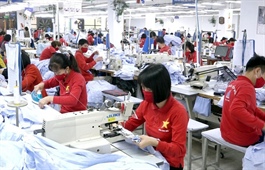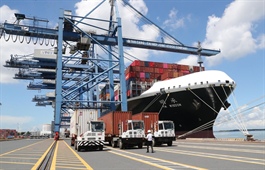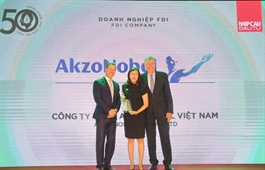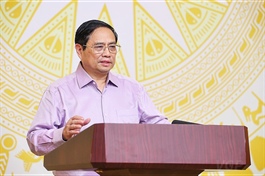Vietnam emerges as focus of Japan’s post-pandemic supply chain diversification
Vietnam emerges as focus of Japan’s post-pandemic supply chain diversification
Japan will give post-COVID-19 support to over 100 overseas Japanese-invested projects, including more than 40 in Vietnam, but the Southeast Asian country needs to overcome certain challenges facing them, a Japanese trade official said.

Nobuyuki Matsumoto, chief representative of the Japan External Trade Organization (JETRO)’s Ho Chi Minh City Office, released the information at a press briefing held recently at the twin launch of the upcoming METALEX Vietnam Exhibition and Supporting Industry Exhibition 2022 in October this year.
Since 2021, the Ministry of Economy, Trade, and Industry of Japan has implemented an investment aid policy for Japanese firms abroad, aiming to diversify supply chains in the face of the heavy impacts of the COVID-19 pandemic, Matsumoto said.
Among the 103 Japanese-invested projects selected by the Japanese government after five rounds of consideration for support, Vietnam took the lead with 41 projects, followed by Thailand with 25, and Malaysia and Indonesia with 12 each, the chief representative stated.
Amid the global production slowdown because of supply chain disruptions caused by the pandemic, Vietnam emerged as an attractive destination for investment, drawing the attention of Japanese enterprises in their supply chain re-development, Matsumoto commented.
A survey conducted by JETRO last year showed that 55.3 percent of Japanese firms in Vietnam wanted to expand their business, the highest rate in ASEAN.
Meanwhile, only about 1.9 percent of enterprises planned to shrink operations and about 0.3 percent of enterprises planned to temporarily withdraw from Vietnam.
After overcoming the adverse impacts of the pandemic in Vietnam last year, 56.2 percent of Japanese businesses expressed their belief that their profitability prospects in the country will be improved in 2022.
However, Vietnamese businesses have also faced several challenges, Matsumoto said.
The survey found that the average local sourcing ratio for Japanese enterprises in Vietnam was 37.4 percent, a slight increase from the previous year, but much lower than in China (69.5 percent) or Thailand (58.4 percent).
Meanwhile, over 86 percent of Japanese firms wanted to increase the local procurement ratio of materials, components, and spare parts for their manufacturing operations in Vietnam.
Domestic enterprises should promptly deal with weaknesses in product quality and manufacturing capability, which hinder the local procurement of components and materials in Vietnam, Matsumoto advised.
He stressed that JETRO is looking forward to more businesses improving their local supply of materials, especially creating support components with higher added value.
JETRO has therefore joined the organization of the Supporting Industry Exhibition 2022 to boost cooperation between firms in supporting industries from the two countries, the trade official said.
In addition, it is necessary for domestic businesses to enhance the quality of workers’ skills and promote better coordination in supply chains, Matsumoto said.
He emphasized that Vietnamese manufacturers must also improve the uniformity in product quality in order to better participate in the global supply chain of components for foreign enterprises.
In order to improve their competitiveness, local firms should improve human resources, apply new technologies and raise productivity to attract more international investment and to deeply penetrate into the global supply chain, the Vietnam Economic News cited Vu Trong Tai, general director of RX Tradex Vietnam, one of ASEAN’s leading exhibition organizers, as saying.
RX Tradex Vietnam will coordinate with the JETRO's Ho Chi Minh City Office, the city’s Center for Supporting Industries Development, and the municipal Investment and Trade Promotion Center in organizing the aforementioned displays at the Saigon Exhibition and Convention Center (SECC) in Ho Chi Minh City from October 6 to 8.
The exhibits will feature plenty of activities related to the Vietnamese metalworking industry, such as technology showcases, welding competitions, technology runways, business matchmaking, and conferences.
Japan, an extensive strategic partner of Vietnam since 2014, has seen its total registered investment in the country amount to over US$64.5 billion by April 2022, behind only South Korea and Singapore, according to the Ministry of Planning and Investment.
In 2021 only, Japanese investors registered a total investment of some $3.9 billion in Vietnam despite COVID-19 impacts, up 64.6 percent from a year earlier, ranking third among the foreign investors in the Southeast Asian country.























